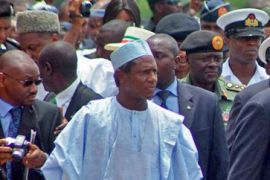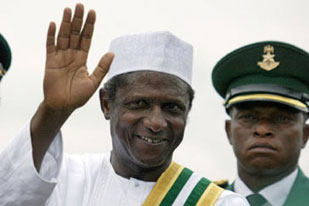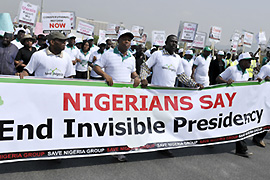Obituary: Umaru Yar’Adua
Nigeria’s president had struggled with several serious health complaints.

 |
| Yar’Adua’s presidency has been dogged by fears over his poor health [AFP] |
A former chemistry teacher, Umaru Yar’Adua was elected to the Nigerian presidency in May 2007.
He was backed by Olusegun Obasanjo, Nigeria’s then leader, as the People’s Democratic Party’s presidential candidate and his election marked the first time in Nigeria one civilian leader had taken over from another, ending a cycle of military takeovers.
However, international observers said the vote was rigged, though Yar’Adua was not widely considered responsible.
“We acknowledge that our elections were not perfect and had lapses and shortcomings,” Yar’Adua said in his inaugural address.
“I also believe that our experiences represent an opportunity to learn from our mistakes.”
There had been concerns Obasanjo would continue to pull the strings following the election, but Yar’Adua proved to be his own man.
Entrenched corruption
Yar’Adua had made the rule of law a major part of his campaign and he was praised for being the first leader to publicly declare his personal assets after taking office.
But enthusiasm for his presidency waned as time passed and he made no headway in fighting entrenched corruption.
He also was unable to stem religious violence in a country split between the Christian-dominated south and a Muslim north.
Yar’Adua was the first leader to represent the Muslim north as part of an arrangement in which power alternates every second election in the ruling People’s Democratic Party (PDP).
Poor health
But much of the focus during his presidency had been on his poor health, culminating in November 2009 when he was flown to Saudi Arabia to be treated for acute pericarditis, a condition linked to his heart.
He was absent form Nigeria for three-months, leading to a near constitutional crisis.
 |
| Yar’Adua was absent for three months, leading to a near constitutional crisis [Reuters] |
While he received treatment in Saudi Arabia, Goodluck Jonathan, his vice-president, was installed as a caretaker.
Legislators had left open the possibility for Yar’Adua to regain power if he returned to the country in good health. He returned on February 24, but he never reappeared in public.
Even before he was hospitalised with heart problems, Yar’Adua had suffered a serious kidney complaint.
In the build-up to elections, it was said that he was seriously ill – a rumour he tried to dismiss by challenging his critics to a game of squash – and he unexpectedly interrupted his campaign to seek medical care in Germany.
While he made some headway on Nigeria’s conflict with fighters in the Niger Delta, other plans slipped behind, including his promise to ramp up power generation in a country frequently hit by blackouts.
His detractors dubbed him “Baba-go-slow” as a result.
State governor
Born in Kasina town in August 1951, Yar’Adua was a devout Muslim whose family has been heavily involved in Nigerian politics.
His father was a minister in the first post-independence cabinet and his late elder brother was number two in Obasanjo’s military government from 1976 to 1979.
Yar’Adua was elected state governor of Katsina, a poor agrarian state in Nigeria’s semi-arid far north, in 1999 and re-elected in 2003.
He presided over the state for eight years, a period during which he is said to have carefully managed state finances, improved the road network and built schools.
But Yar’Adua failed to deal with the state’s water shortages or ensure food security. Also, his critics say a number of lucrative building contracts were given to his friends and relatives, accusations that he denied.